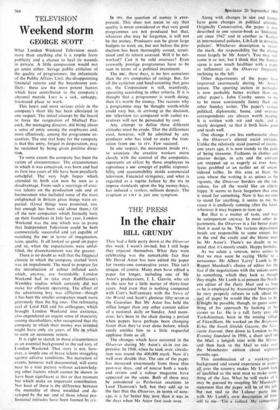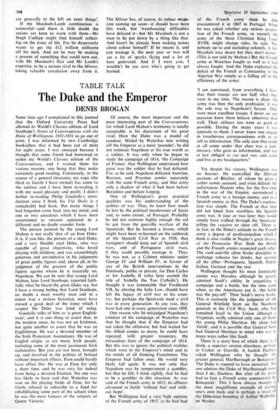THE PRESS
In the chair
BILL GRUNDY
They had a little party down at the Observer this week. I wasn't invited, but I still hope they enjoyed themselves. What they were celebrating was the remarkable fact that Mr David Astor has now edited the paper for twenty-one consecutive years. This isn't unique, of course. Many men have edited a paper for longer, including one of Mr Astor's predecessors, J. L. Garvin, who sat in the seat for a little matter of thirty-four years. And even that is nothing compared with Carr's half-century with the News of the World and Scott's glorious fifty-seven at the Guardian. But Mr Astor has held the office longer than any other current editor of a national, daily or Sunday. And more- over, he's been in the chair during a period when papers have perhaps been changing faster than they've ever done before, which surely entitles him to a little respectful applause from us all.
The changes which have occurred in the Observer during Mr Astor's sit-in are im- pressive. In 1948, when he took over, circula- tion was round the 400,000 mark. Now it's well over double that. The size of the paper has increased enormously from those thin post-war days, and of course both a week- end review and a colour magazine have appeared on the scene. Both of these may be considered as Pavlovian reactions to Lord Thomson's bell, but they add up to the fact that the Observer, in terms of acre- _ age,-is a far-better buy now than it was in the days when Mr Astor first took over. Along with changes in size and format have gone changes in political attitudes. Originally Conservative, the paper is now described in one source-book as 'Independ- ent since 1942' and in another as 'Radical in international policies, Lib-Lab in domestic policies'. Whichever description is nearer the mark, the responsibility for the change must largely be Mr Astor's. You may wel- come it or not, but I think that the Sunday scene is now much healthier with a paper as influential as the Observer frequently inclining to the left.
Other departments of the paper have improved enormously during Mr Astor's tenure. The sporting section in particular is now probably better written than any other paper's. John Crosby seems to me to be more consistently funny than any other Sunday writer. The paper's various political, diplomatic, home, and overseas correspondents are always worth reading. It is written with wit and style, and is nicely designed, so that it both looks good and reads well.
One change I am less enthusiastic about is the Observer's altered social attitudes. Unlike the relatively staid journal of twenty- one years ago, it is now trendy to the point of being tiresome. Fashions in clothes and interior design, in arts and the anti-arts are snapped up as eagerly as ever Auto- lycus grabbed at an earlier set of uncon- sidered trifles. In this area at least, the area where the writing is as unisex as the rig-outs, the Observer borders on the ridi- culous, for all the world like an elderly hippy. It seems to have forgotten that once it stood for something. Now it has no time to stand for anything, it seems to me, be- cause it is endlessly running after the latest, wherever it may happen to turn up.
But that is a matter of taste, and may be unimportant anyway. In most other de- 'partments, the Observer is a far better paper than it used to be. The various department heads are responsible to some extent, but in the end the credit and the blame must be Mr Astor's. There's no doubt in my mind that it's mostly credit. Happy birthday.
As we salute a veteran, news comes in that we may soon be saying 'Hello' to a newcomer. Mr Albert 'Larry' Lamb is Mr Rupert Murdoch's choice of editor for the Sun if the negotiations with the unions come to something, which they look as though they might. Mr Lamb is at present the North- ern editor of the Daily Mail and as long as he is employed by Associated Newspapers he very properly refuses to talk about the kOrt of paper he would like the Sun to be. Aright be possible, though, to guess some- thing of his approach by looking at his career so far. He is a tall, forty year old Yorkshireman, born in the mining village of Fitzwilliam. He worked on the Brighouse Echo, the South Shields Gazette, the New castle Journal, then down to London to the Evening Standard in 1956, a short spell on the Mail, a longish stint with the Mirror and then back to the Mail to take over the Manchester edition about eighteen months ago. This combination of a working-class background and sound experience in papers all over the country makes Mr Lamb look as qualified as the next man to make some- thing of the Sun. What he will make of it may be guessed by coupling Mr' Murdoch's statement that the paper will be of the left. but not tied to the Labour party line. with Mr Lamb's own description of him- self to me—Tin a radical. My sympathies
are generally to the left on most things'.
If the Murdoch-Lamb combination is successful—and there is little doubt the unions are keen to work with them—Mr Hugh Cudlipp might find himself reflect- ing on the irony of life. For he desperately wants to get the f12 million millstone off his neck. And yet he may be making a present of something that could turn out, with Mr Murdoch's flair and Mr Lamb's expertise, to be a serious rival to the Mirror, taking valuable circulation away from it. The Mirror has, of course, its colour maga- zine coming up soon—it should have been this week, but 'warehousing' difficulties have delayed it—but Mr Murdoch is not a man to be put down by a thing like that. And hasn't he already been making noises about colour himself? If he means it, and can manage it, the next year or two will see a lot of sparks flying and a lot of heat generated. And if I were you, I wouldn't be too sure who's going to get burned.









































 Previous page
Previous page